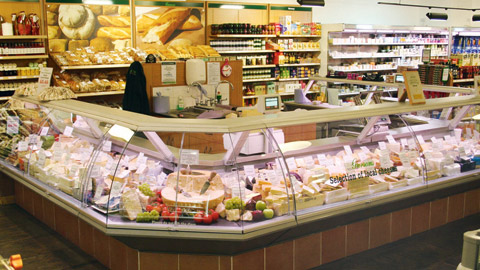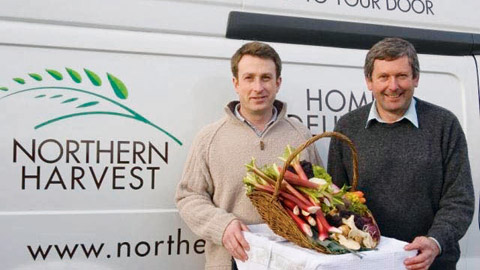Farm retailing tips and advice

Farm retailers and farmers market operators gathered in Edinburgh to learn from each others’ businesses at FARMA‘s annual conference. Nancy Nicolson reports.
There’s more to aim for in farm retailing
Farm retail businesses may think they’re doing well but many are undercharging for their produce and failing to realise their full potential.
That was the advice from Nigel Chandler after spending time travelling around the country visiting farm shops.
The manager of Garsons Farm Shop, a multi-million pound turnover Surrey-based business told delegates to FARMA’s annual conference that individual retailers needed to do more research and to realise the full potential of their produce.
“The big supermarkets certainly don’t undercharge and you are offering a unique shopping experience,” he said. “You’ve got well-trained staff and give people a cheap day out.
“This is leisure retailing and while I’m not suggesting you go out and charge more for everything, you need to do your research fully because there is scope for more tweaking to be done.
“For instance strawberries broke the £4 a kilo barrier for pick-your-own last year and there was no resistance to the price. In these hard times there’s not a lot of growth so if we can squeeze margins it will help especially this year.”
Mr Chandler highlighted the value of FARMA’s benchmarking scheme, using the example of a 1lb pot of honey which he had seen vary in price from £7 in Devon and Wales to as little as £3.50 in Derbyshire. His store sold the product at £5.99.
“If you’re only charging £3.50 then you should be aware there’s more margin to be had.”
He advised delegates to be aware of the type of business they were competing with. “Is it department stores, farmers markets or supermarkets?” he asked. “At Garsons we’re pitching at Waitrose level because that’s where the most discerning customers go.”
Garsons Farm Shop had changed its style from predominantly a self-service outlet to offering product expertise at specialist butchery, bakery and other counters which had led to an increase in margins.
Grasp social media opportunities – but handle with care
Social media such as Facebook, blogs and Twitter can work wonders for farm businesses but will only bring results if they are given regular commitment and passion.
Alicia Cowan, a social media coach, told farm retail representatives that they also needed to show personality and be different if they wanted to make an impact.
“Be useful – tweet out the specials on your menus, for instance – and give followers a glimpse behind the scenes of your business,” she said. “Share with your community and fans and get people talking about you. And listen to what they tell you.
“It’s a fantastic way of finding out what your audience is thinking and saying. It’s low cost, it’s accessible to everyone, it reaches out to customers and suppliers and it can lead to new partnerships. But don’t try to do everything. Choose one and do it well rather than trying to spread yourself too thinly.”
She also warned new users to beware of “banana skins” such as over-sharing information.
“Understand your values and know exactly what you want to portray. Don’t tell people you’re hungover or how you hate your clients,” she said. “And don’t abandon your blogs, Facebook and Twitter accounts once you’ve set them up. You need to make updating the sites a non-negotiable part of your business.”
Ms Cowan recommended putting links to online presences on business cards, in newsletters, on signatures. “Connect the dots and make it easy for people to find you. And don’t over-automate your presence. If you’re not having proper conversations there’s no point in being there.”
The Google Analytics service would help to discover more about visitors to sites. “It’s a free tool so talk to your web developers about getting it. It shows where traffic is coming from, how much time they’re spending on your site, the pages they’re looking at and much more. It’s an extremely important part of your marketing.”
New thinking achieves dramatic farm retail expansion
The owner of successful Cheshire online retail food company, Northern Harvest advocated thinking “outside the box” when considering farm business development plans.
Tod Bulmer did precisely that when the time came to expand his own farm shop at Kenyon Hall Farm near Warrington a decade ago. Instead of expanding the shop floor he opted instead for a revolutionary farmers market on wheels, delivering to Manchester, Merseyside and the counties of Lancashire and Cheshire.
Northern Harvest now sells more than £1m of produce a year online and Mr Bulmer told the FARMA conference that there were many advantages in being a home delivery business rather than a farm shop.

“We have access to more customers, we can list at least 10 times as many products as can be displayed in a farm shop, there’s no wastage, people get deliveries direct to their doorstep and we have a five day week,” he explained.
“We stock nothing and nothing is bought until it is sold. All payments are electronic and 98% of orders are done online.”
The company philosophy is “local food for local people” and while some of the produce sold is organic, there is also a complete range of conventional produce.
“Back in 2002 when we started, almost all home delivery was based on organic box schemes. We thought it was more important to be good, seasonal, tasty, quirky and from small-scale producers.
“As much as possible we source produce from within the delivery area so we tick the food miles box. We have more than 80 local suppliers and our food has to have a story. But as well as food we try to offer a comprehensive service to customers so if they want pet food, road salt or logs and we can acquire it then we do.”
Understand what customers want and how they shop
Edward Garthwaite of Blacker Hall Farm, Wakefield opened his farm shop – “a barn in the middle of nowhere” – 12 years ago with his mother, his sister and a butcher to help. Today he employs a staff of 105 and the on-farm business is continuing to grow.
At first Mr Garthwaite was adamant that he wanted only a serve-over counter and no pre-packaging of meat but has since changed his views.
“I thought pre-packaging was just a supermarket approach but then I realised how important it was for customers to be able to pick up and go with a pack of sausages or mince if the butchers were busy and I believe there’s even more potential to further develop the pre-pack market for farm shops in future,” he told the FARMA conference.
“But what’s most important is attention to detail. The presentation has to be spot on. The labels need to be dead straight and the sausages all curved the same way because then it looks as though we care. And if we care about that the message is clear that we also care about the quality of the sausage and the welfare of the pigs.”
He added that he had always seen himself as a farmer but then had to learn how to be a butcher, a retailer, a stock controller and finally, most importantly of all, how to manage people.
Specialist workforce
Separating the workforce into dedicated production and shop floor sales teams led directly to a rapid expansion from a turnover of £5,000 a week to more than £25,000 a week for this successful Yorkshire farm shop.
The team split meant the workforce could be carefully selected for particular tasks.
“That simple split enabled us to drive things forward. The production guys have to focus on only one thing alone, to become better and better at production, so as employers we’re in a much stronger position when it comes to employing people.
“Our shop floor manager came from Marks & Spencer and our production guys have worked in big production factories. For us it’s getting production bang on right. We expect them to be experts in their own fields not everything.
Supermarkets want your business!
Beware of supermarkets muscling in to the territory of farm shops and farmers markets, warned retail advisor John Stanley.
Farm retailers needed to:
• Capitalise on growing demand for local food with provenance
• Take the lead on food hygiene and traceability issues
• Focus more on online retailing
• Take full advantage of declining customer service in other areas of food retailing
• Tackle consumer confusion over farm shop and farmers’ markets designations
• Work more collectively within the sector
• Put greater effort into attracting young mothers and their children to shop on farm
• Make more of farmers who were increasingly becoming food heroes.
About FARMA
FARMA is a co-operative of farmers, producers selling on a local scale, and farmers’ markets organisers. It is the largest organisation of its type in the world, representing direct sales to customers through farm shops, Pick-Your-Own, farmers’ markets, home delivery, on-farm catering, and farm entertainment.
FARMA inspects farm shops and farmers markets and offers members benchmarking services to help them improve business efficiency. There are 4,000 farm shops and 750 farmers markets in the UK.
